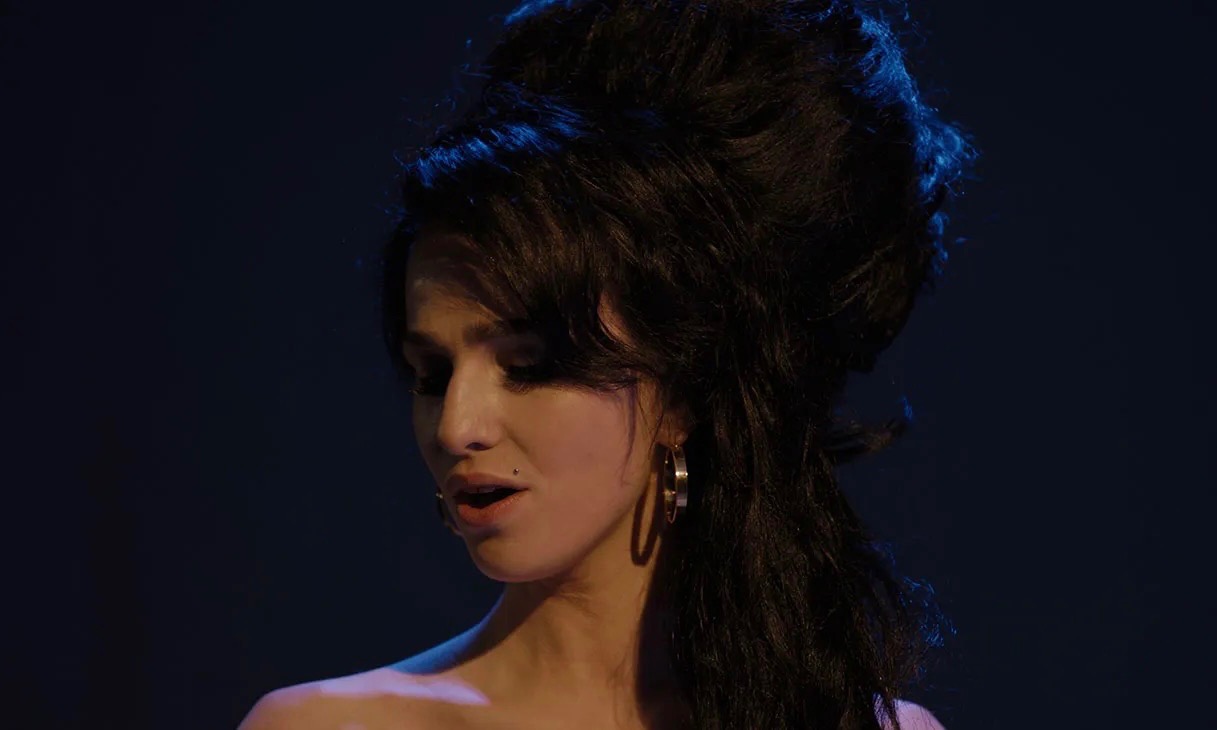On Saturday, I went to the Apple Cinemas in Simsbury, Connecticut, a theater I’d never been to before, to see the Amy Winehouse biopic film, Back To Black, which was directed by Sam Taylor-Johnson (50 Shades of Grey, Nowhere Boy). Going into the film, I had mixed feelings. On one hand, I was excited that one of my all time favorite musicians would get her tragic story told. But on the other hand, I was nervous because she’s not alive to speak for herself, and the people who were most detrimental to her life and career are alive to spin the story in their favor. Those two factors coupled with the brigade of early negative reviews meant one thing when I went to go see Back To Black: I needed to go into it with a clear mind.
I went in clear minded, obviously hoping that the hack, predator director Sam Taylor-Johnson would do Winehouse justice because she’s a figure who means so much to me. But when I left the theater with my parents, I felt gross. I felt like I needed to take a shower because all that Sam Taylor-Johnson and company did was make Winehouse look like a tactless and ditsy whore that was on a downward spiral from day one. While Winehouse didn’t make great choices in her life from her drinking and drug use to men she fancied, she was more than a drunk and more than an addict and more than a whore. She was a generational talent that revitalized jazz.
SPOILERS AHEAD!
The Good
There isn’t a lot of good in Back To Black, but I did have a few positive takeaways from it. The first being that the film did turn me onto The Shangri-Las. Blake plays it for Amy when they’re in the pub for the first time together and does a fun little dance while lip syncing Leader of the Pack. That song has since been on repeat for me the past few days.
The other positive was that I forgot how great of an album Frank was. While the film didn’t fully touch on it, it reopened my listening of Winehouse’s first studio album, which still bangs. So in reality, there was less good in the film than I thought. The only aspects I truly liked were the music, and that’s a shame. You go into a film that surrounds music anticipating that the music will be high level, especially a biopic about an artist you like. I guess that’s the one thing that Sam Taylor-Johnson go right. Congrats, I guess.
The Bad
I have a lot to say when it comes to what was bad about Back To Black. I’m not sure how much of it I’ll write, but I wanted to start with how on the nose a lot of the film was. When I say that, I mean that there are moments set up in such a corny manner to make it so a following scene fits nicely, but it feels more rigid and forced than free flowing.
Being Too On The Nose Feels Condescending To The Audience
The prime example of this happening was in the first twenty minutes of the film. Amy gets home from her dads and her boyfriend comes over. She immediately jumps him, making out with him in an attempt to get in his pants. But all her boyfriend wants to do is talk. A few scenes later, Winehouse is performing the song Stronger Than Me, which would turn into the lead track off her debut album Frank. The lyrics to Stronger Than Me go “You always wanna talk it through, I don’t care, I always have to comfort you when I’m there, But that’s what I need you to do, stroke my hair. ‘Cause I’ve forgotten all of young love’s joy, Feel like a lady, you my ladyboy.”
The very next scene after her performance, she’s sitting with her soon to be manager and her boyfriend. She’s asked if the song was about a real person. At that point, she turns and sort of laughs in her boyfriends direction and they break up with him telling her she’s crazy.
That scene completes the double whammy of being on the nose and treating the audience like they’re dumb with “foreshadowing“. It’s on the nose because in the lone interaction we saw between Winehouse and her boyfriend, he wanted to talk. In a way, it makes Winehouse’s lyrics feel simple and that she was being on the nose. The scene also tries to foreshadow by having her boyfriend call her crazy and leave her. Matt Greenhalgh wanted to audience to think “Oh, is she going to be crazy and will that effect her career?” No one had that thought process and it felt condescending.
The Only Person That Was Really Painted Poorly Was Amy
When the end credits rolled, all I could think was that the person who was portrayed the worst was Winehouse. Back To Black didn’t expound Winehouse’s legacy. It works more to tear it down. Greenhalgh, who wrote the script, made it seem like Winehouse was on a downward spiral from jump street and that led to her being a vacuous person. At times, the way the film was directed made Winehouse’s words hollow. The whole film, she preaches about wanting her voice to change the world, but she’s always reduced to a junky drunk. Winehouse’s voice changed music. She won five Grammy’s in 2007 for Back To Black, which is truly a massive feat. But no, she’s a drunk airhead. Or at least that’s what the film tells us.
The portrayal of her ex-husband and source of material for Back To Black, Blake Fielder-Civil by Jack O’Connell, was rather favorable in comparison to Winehouse’s. Blake looks like he’s a drug addict that was chewed up and spit out by Winehouse. It looked like he never used Winehouse, or at least didn’t intend to, as there’s literally a scene where his friend tells him that he should get back together with Amy and to essentially use her for her money, but Blake seems against, even disgusted by the idea. Nevertheless, he does in a sort of reserved manner that doesn’t fit the bill of the real Blake Fielder-Civil. He’s a guy who manipulated Winehouse emotionally and pushed her deeper into a hole of drug use. He’s a bad person that didn’t come off as one in the film.
Then, there’s Mitch Winehouse. If you want a real look at Mitch Winehouse, watch the 2015 documentary from A24, Amy. Mitch Winehouse had a stranglehold on his daughters career that started with him turning a blind eye to Amy’s drinking. In the film, while he doesn’t exactly put his foot down on her drinking, he does seem extremely concerned. And it evolves into him being eager about bringing her to rehab. Again, not something that fully happened in real life. I said it prior, but watch the documentary Amy. That’ll give you the full Mitch Winehouse; a father who didn’t want his daughter in rehab.
Performance Report Card
Marisa Abela: D
I wanted to give Marisa Abela an F for her performance as Winehouse when I immediately exited the theater. After cooling off and reflecting, I realized that, while her performance was bad, it wasn’t that bad. She resembled Winehouse a bit more than I had expected and vocally was close to the jazz singers unique voice, but when it came to the acting, I felt like Abela missed. This rendition of Winehouse felt cartoonish, and I know that she was a rather animated singer on stage, it looked like Abela was trying to enunciate those ticks and movements too much to where it felt like a parody of Winehouse.
Maybe Abela could become a good actress down the line. She’s still young and potentially has a long career ahead. I hope that this role and performance doesn’t torpedo her before she really even gets going.
Jack O’Connell: C
It’s tough to judge the performances outside of Winehouse due to my jaded perception of them because they were portrayed incorrectly to what happened in Winehouse’s life, but I thought that Jack O’Connell as her husband and muse to write the album Back To Black was okay. No remarkable because there was a lack of depth to the character, but serviceable. He had decent fits of rage, but again, I couldn’t get past the fact that they made him look, almost, like a good person.
Eddie Marsan: C-
A grosser portrayal, and it’s not Marsan’s fault, then O’Connell as Blake was Eddie Marsan as Winehouse’s dad, Mitch. The film doesn’t touch, really at all on his manipulation his daughter. Like I said, not Marsan’s fault. He’s a generally good actor who I liked in The World’s End, but he just felt flat in this film. He suffers from the same symptom that O’Connell does, where the writing of the character was hollow, but that doesn’t help that Marsan wasn’t great.
Critical Reception
In the films opening weekend, Back To Black has made $37.8 million dollars at the box office. Honestly, that’s a great number. While I don’t like the movie, I’m happy that people flocked to the theater to see a film about Winehouse. Reviews wise, on Letterboxd, Back To Black has a 2.6 out of 5 star average. 1,693 users gave the film 5 stars, while 3,055 users rated it 1 star or lower. On Rotten Tomatoes, an anomaly occurred. I’m in lockstep with the critics and polar opposite to the audience score. The Tomatometer rating from critics is 35%, whole the Audience Score is 85%.
The reason I think that the film isn’t getting completely lambasted by the audience is that I don’t think many people know Amy Winehouse’s story in full. They know the hit songs and that she’s dead. But outside of that, they don’t know about the more sinister elements of the people around Amy.




